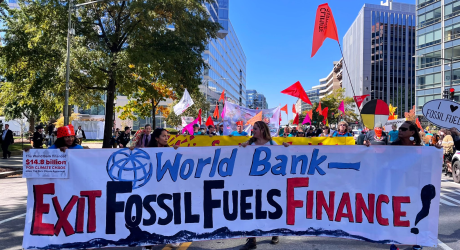PUBLIC FINANCE
Governments are still spending billions subsidizing oil, gas and coal. We need to #StopFundingFossils and start investing in the future.
OVERVIEW OF WORK
Since the Paris Agreement, G20 governments have continued to finance more than USD 77 billion dollars annually in fossil fuels through multilateral development banks (MDBs), bilateral development finance institutions (DFIs), and export credit agencies (ECAs). This is three times the support they provide to clean energy. Beyond providing this direct monetary backing, these institutions reduce perceived risk and provide a government stamp of approval on fossil fuel projects that often serves to crowd in private finance. While recently the level of fossil fuel support has started to drop, institutional policies to exclude fossil fuel finance are needed to ensure this progress continues.
While a number of public finance institutions committed to ending coal finance in the early 2010s, it wasn’t until 2017, following years of campaign pressure by Oil Change and others, that the World Bank made a meaningful commitment to stop financing for upstream oil and gas. Following an intense campaign effort, in 2019 the European Investment Bank committed to ending nearly all oil, gas and coal finance. Recently, the UK announced it would end overseas oil and gas finance, and the EU and US, among others, have signalled that they intend to follow suit. Building off these successes, OCI is now working to secure further commitments from governments and public finance institutions on ending public finance for fossil fuels.
LATEST PROGRAM POSTS
Government-backed LNG projects are exposing the public to stranded asset risks and causing emissions nearly twice the annual emissions of Canada.
Explainer: Latest data shows the World Bank Group and its peers are still locking in a fossil future
Ahead of the 2023 World Bank Spring meetings, we have compiled the major MDBs' 2022 energy finance data for the first time.
The OECD has adopted a new list of “climate-friendly” projects that will benefit from preferential financial terms for export support. But a number of projects are poorly defined, potentially allowing for preferential financial incentives for export credit agency investments in gas.
The Netherlands just contradicted its COP26 pledge to end public finance for fossil fuels by the end of 2022 and shift this money to clean energy by issuing a commitment to insure the Brazil Santos Basin Pre-Salt Pole oil and gas production project for around USD 321 million.
LATEST PROGRAM RESEARCH
Despite the urgent need to phase out fossil fuels, Japan is driving the expansion of liquified gas (LNG) and other fossil-based technologies like ammonia co-firing, worsening the climate crisis and harming communities and ecosystems.
*Updated February 2024* Oil Change International analysis shows that several major countries continue to pump $6.2 billion in public finance into international fossil fuel projects despite committing to end this support by the end of 2022.
New research shows that Organisation for Economic Co-operation and Development (OECD) countries supported fossil fuel exports by an average of USD 41 billion from 2018-2020, almost five times more than clean energy exports ($8.5 billion).


